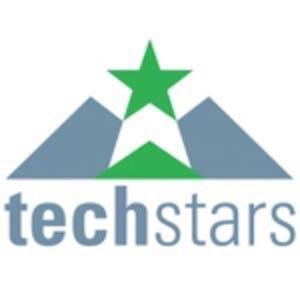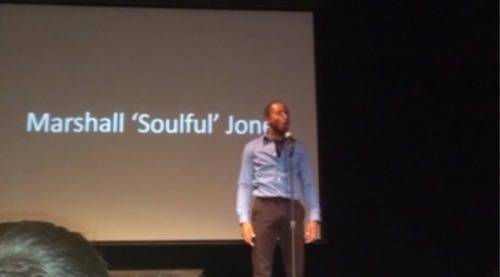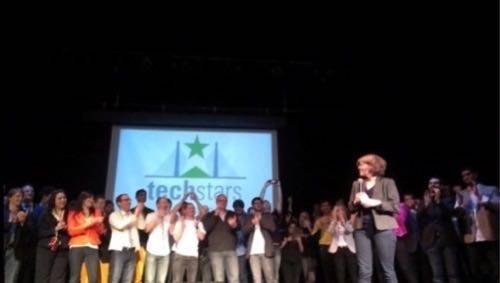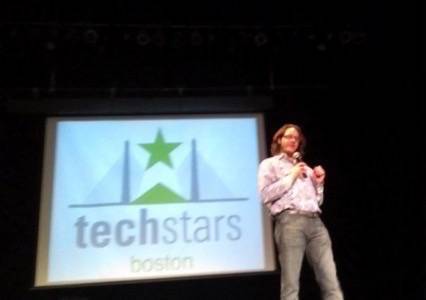As a startup, “if you cannot nail a presentation, you’re done.” That is what Katie Rae, managing director of TechStars Boston, said after the accelerator’s Demo Day yesterday. 13 TechStars companies went on stage to pitch their products to investors, and every single pitch passed with flying colors.

Getting the pitch right is one of the most important parts of a startup’s life cycle. It is vital to nail the Demo Day pitch, of course, but learning how to give a thoughtful, dynamic presentation is a skill that pays benefits far beyond the stage.
The pitches at Demo Day Boston were as varied as the companies presenting them. Timothy Ericson, the CEO of Zagster, the “Zipcar for bikes,” rode out on stage on a branded bicycle. K Young, CEO of Mortar, a company working to “fix” Hadoop, stood in solemn profile describing how his company is going to create tools to make big data usable to any company. The pitch for Libboo, a book publishing and promotion platform, started with a stirring poem from slam poet Marshall “Soulful” Jones before CEO Chris Howard gave an impassioned speech about the problems his company is trying to solve.

Not every company from the spring class of TechStar’s Boston 2012 is going to go on to fame and fortune. There are a couple very strong companies and a few others that may have trouble surviving in crowded markets. But, when it came to the pitch, nearly every one of them earned an “A” for the day.
Rae and the TechStars staff prepare companies for the Demo Day pitch from Day One at the accelerator. It starts with the elevator pitch, where teams present their idea and then get drilled with hard questions to see how well the pitch, and by extension the company, holds up. In the third month of TechStars, CEOs start practicing their pitches nearly every day for a month before the fateful Demo Day.
“It is never a simple process. The first days of TechStars is like, ‘Are you sure you are on the right track?’ That is where you pitch your idea and pitch your company to a hundred really hard people and have them ask really hard questions,” Rae said. “The second thing is to really dig in and to make sure you are getting the right data and customer development. And then the third thing is that once you know you are on the right track, how do you tell a story? How do you get across to the other people why you care about it, why it is important to you and what you are trying to do. That’s is where I start. Why do you care and why should I care?”

When it comes right down to it, Demo Day is just that. A day. It is not like these companies build their products at breakneck speeds for four months and then cease to be companies. Demo Day is the unofficial graduation for TechStars companies and there is the requisite amount of celebrating afterward. Entrepreneurs drink champagne and beer in the office, eat catered food, and pat each other on the back after Demo Day is over. There is much to be happy about, especially for those companies that used Demo Day to raise additional funding.
But it is really just the beginning.
“What happens beyond that is that they are trying to get investors. They have to build investor stories and then they also have to build customer stories. When they go up to a customer, they have to be able to tell their story. Same with investors. Same with Demo Day,” Rae said.
When preparing CEOs for Demo Day pitches, Rae urges the aspiring executives to be themselves. When it comes to pitches, there is a lot of information available on the Web, and CEOs can trap themselves into thinking that their pitch needs to look exactly like somebody else’s perfect pitch. Rae tries to cull that out of people and focus on getting them to tell their story.

“I think the first [mistake] is that they get very robotic and they think their pitch needs to look like the last person that did a great pitch and they need to copy it. Never works. So we often have to rewind people out of that. ‘Wait, but Jeff did a pitch just like that and it was perfect.’ But that is not your story. It has to be authentic or it will flop,” Rae said.
Another mistake is trying to cram too much data into a presentation. Companies create decks of dozens of slides, trying to get everything they possibly can into the pitch. Those crowded decks often look terrible, especially when projected on a 20-foot screen behind the CEO. Here, the “KISS” principle comes into play: Keep It Simple, Stupid.
There is also a degree of showmanship to a pitch. Demo Day’s first presenter, CEO Winston Mok of Simply Good Technologies – a company working on mobile couponing based on influence – showed plenty of charisma and showmanship on stage. That works for Mok and his product. It might not work for Michael Nugent of Bison Alternatives, a company working on a database for alternative investments. Ericson riding out on a bike works. Dropping from the ceiling? Not so much.

“Some people take that too far,” Rae said. “Come up with crazy ideas about coming in from the ceiling and things that are kind of cutesy. And some of them just take it too far. Some of that is OK. If it doesn’t match your company, you shouldn’t do it. If you are not funny, you shouldn’t try to be funny.”
The most impassioned, if unorthodox, pitch of the day came from Libboo’s Howard. He said he was coached to provide a lot of data in his pitch because it is a little difficult to understand the concept. He had a full deck of slides waiting to go on Friday before the presentation the next Thursday. In the end, he tossed that pitch, something he had been working on for the better part of a month, and went with his heart. In the end, it was not about the marketing and stats of his platform but rather an emotional soliloquy about his journey and his company.
“I was really genuine when I said that I want people to understand ‘the who’ and ‘the why’ more than ‘the how’ and ‘the what.’ That is so important to me. Everybody says, team, team, team, team, team, and that is true, and everybody does invest in a team. As an early-stage startup, for me, you are never going to change your founders or CEO, and it is about team but it is more about founders and CEOs. So, I wanted to create a pitch that is more about me than the product itself,” Howard said.
TechStars ends with Demo Day. For the companies, Demo Day is just the beginning. The skills that companies learn will be carried with them for as long as they exist. As Rae said, if a company cannot nail the pitch, they are done. That is a lesson that extends well past the day those companies leave TechStars.

















